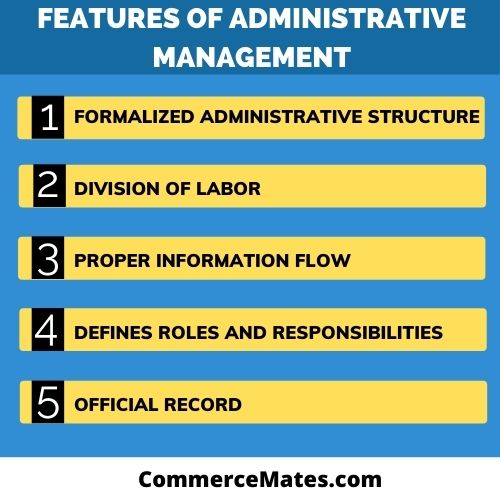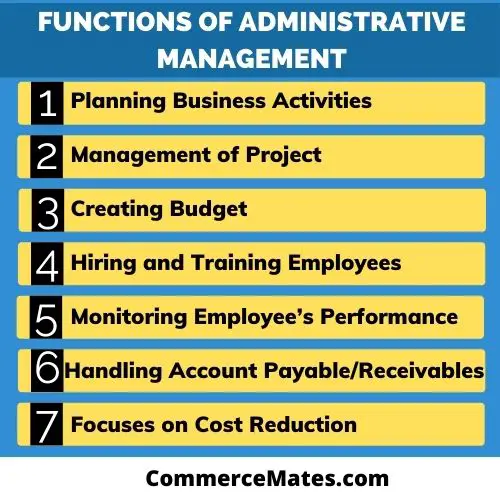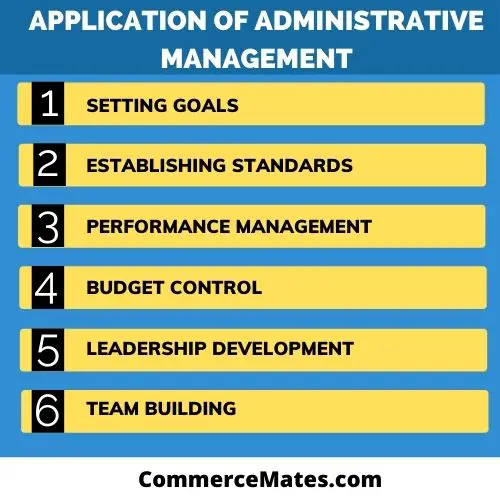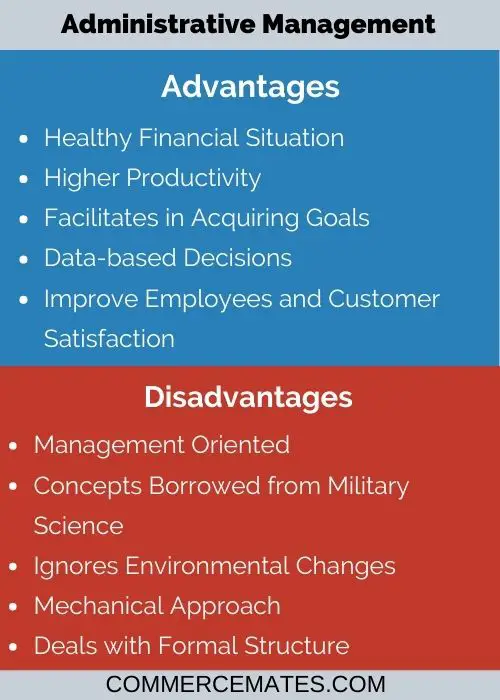Contents
Meaning of Administrative Management
Administrative Management is a term concerned with designing and managing the whole structure of organization. It involves monitoring the day to day activities of organization for ensuring uninterrupted continuity in today’s fast pace environment. Administrative management is an administrative theory that focuses on creating a formalized administrative structure, developing a proper hierarchy of authority, deciding their key functions and responsibilities, and proper division of labor within the organization. It is very key function for each organization that enables management of information via peoples. Administrative managers keep an eye on information flow within the organization so that all resources are efficiently utilized for better productivity.
Features of Administrative Management
- Formalized Administrative Structure: Administration management involves designing a formalized administrative structure for smooth functioning of organization. Under this structure, there is a clear hierarchy of authority from top to bottom denoting their responsibilities and functions.
- Division of Labor: It involves a proper division of labor across the various departments of organization. Workers are allocated task based on their skills and qualifications that enables in obtaining optimum efficiency.
- Proper Information Flow: Administrative management ensures that there is a proper network of information flow for decision making within the company. It focuses on establishing such a communication channel where there is free flow of information in both directions among supervisors and workers.
- Defines Roles and Responsibilities: The Theory of administrative management is concerned with clear description of roles and responsibilities of each people working within the organization. Every supervisor is delegated authority to influence activities relevant to his field and expertise.
- Official Record: It involves maintaining a systematic record of each business activity of an organization. All accounts are duly maintained which records each expense and income of business on a regular basis for avoiding any discrepancies.

Functions of Administrative Management
- Planning Business Activities: Administrative managers perform the task of making proper plans regarding various tasks to be performed within the organization. Every plan and policies are framed with a motive of attaining desired targets.
- Management of Project: Effective management of project is must for ensuring its completion as per the decided schedule. Administrative managers perform a task of supervising every activity related to project undertaken for ensuring desired outcome.
- Creating Budget: It develops an optimum budget for carrying out the activities of project undertaken. It is the duty of administrative managers to oversee every activity and ensure that all expenses go with the limits of pre-allocated budget.
- Hiring and Training Employees: Presence of right employees within the organization is must for deriving better results. Effective administrative management focuses on hiring right candidates and providing them training as per the work requirements of organization.
- Monitoring Employee’s Performance: Administrative management keep an eye over the performance of peoples working within the organization. Supervising the activities of employees helps in finding out deficiencies and maintaining the required efficiency.
- Handling Account Payable/Receivables: It maintains proper accounts for recording all financial transactions of organization. Each and every transaction done with creditors and debtors are properly maintained for avoiding any errors and confusion.
- Focuses on Cost Reduction: Administrative management aims at achieving better efficiency in performing activities of company. It conducts several researches and analysis for attaining production technique that assist in overall cost minimization.

Principles of Administrative Management
There are 14 principles of Management given by Henri Fayol’s
- Division of Work- It means dividing the work among individuals across various departments of organization. Division of work is done according to the skills of people which leads to specialization, specialization helps in enhancing the overall efficiency that results in raising the profitability and productivity of company.
- Authority- Maintaining a proper balance in between the authority (power) and responsibilities (duties) is must for effective functioning according to Henri Fayol’s. Managers should be given authority to give orders with reference to their responsibilities. In case if manager has more authority than responsibilities on him, then he may misuse his powers. On the other hand, in case of excessive responsibility managers may get frustrated.
- Discipline- Discipline means respecting and obeying rules and regulations that runs the organization. These rules should be strictly followed and should not be broken. Disciple may be of 2 types: Self-discipline and Enforced discipline. In order to maintain discipline, impartial judgement and a proper supervision is required.
- Unity of Command- Unity of command states that every employee should be accountable to one employer only. A subordinate should receive order and report to only one superior. Dual subordination should be avoided as it poses various difficulties in functioning of managers.
- Unity of Direction- Unity of direction means that all team members working towards the same objective should be directed by one superior using one plan. It will lead to proper coordination of actions carried out by organization.
- Subordination of Individual interest to General interest- It means that interest of organization should always be kept supreme by manager. Interest of any individual or group should not be given much importance or prevail over the general interest of company otherwise it may lead to collapse of organization.
- Remuneration- It involves paying fair amount of remuneration to all employees in accordance with the work done by them. Company should adopt a fair remuneration policy as it influences the satisfaction level of employees. Good remuneration is needed for acquiring qualified employees and attaining better performance. The policy should include compensation in both financial and non-financial terms.
- Centralization- It is concerned with distribution of authority level across various levels of management and states that a proper balance in authority division shall be made. In centralization, authority for decision making is only with higher level managers and subordinates do not have any role in decision making. Whereas, in decentralization even the subordinates have some right to participate in decision-making. Maintaining a proper balance between the degree of centralization and decentralization is must for smooth functioning of organization.
- Scalar Chain- Scalar chain is a formal line of authority, responsibility and communication of a company. It is also termed as chain of command which describes the hierarchy of authority from top level to bottom and superiors-subordinate’s relationship within the organization. It tells which individual stands where in the organization.
- Order- Everything in the organization must be at right place in right order and at right time. A proper order for all materials and people is must for proper functioning. It should also be ensured work environment is safe, clean and tidy.
- Equity- Equity is a combination of fairness and kindness. It means that an employer should deals kindly and show justice towards all of its employees in the same manner. It develops a sense of loyalty among employees working in organization.
- Stability of Tenure of Personnel- Employees should be provided a job security and various career improvement programs that enhance their productivity. A proper time to be given to them for settling inti their jobs as instability would lower their efficiency.
- Initiative- Every employee should be given proper freedom for developing and execute plans. All staff should be encouraged for an initiative as it provides satisfaction to them which leads to success of company.
- Esprit de corps- Esprit de corps means “Team spirit” and involve promoting team spirit within the organization. It will lead to unity, harmony and co-operation among employees working in company. It would prevent any divide and rule policy which will impart a great source of strength thereby enhancing the overall quality.
Application of Administrative Management
- Setting Goals- Administrative management theory is widely used for setting the targets of an organization. Identification of goals helps in deciding a clear plan of action for accomplishment of such goals. This management strategy performs an analysis of input received from within the organization for defining targets.
- Establishing Standards- It focuses on establishing a set of standards for providing value to stakeholders. These standards are enforced for ensuring that all products or services produced are of acceptable quality.
- Performance Management- This management strategy is used for reviewing the performance of organization from time to time. The theory of administrative management ensures all activities are going efficiently in the right direction for achievement of goals. Feedback from team members is encouraged and directions toward their roles is given for deriving the desired result.
- Budget Control and Cost Management- Administrative management strategy keeps an eye on all financial transactions taking place. It decides an appropriate budget for accomplishing the product undertaken and ensures that all activities within the limits of pre-allocated budget. It works towards minimizing the cost involved by focusing on adopting cost efficient techniques.
- Leadership Development- Effective administrative management strategy focuses on developing leadership qualities among the team members. It aims to promote leaders from within the organization that is helpful in raising the productivity.
- Team Building: This management theory aims to promote a sense of unity and harmony among team members working in an organization. It implements team building strategies for motivating peoples towards their roles. Team building also results in developing better relationships among team members and loyalty towards company.

Importance or Advantages of Administrative Management
- Healthy Financial Situation: Administrative management has an efficient role in managing financial affairs of business organization. It is a management strategy that focuses on maintaining all expenses within the decided budget. It supervises all finances of company and ensures that there is no wastage of money which helps in maintaining a healthy financial situation.
- Higher Productivity: It aims at attaining the better coordination of all resources for deriving maximum output. The theory of administrative management matches the members of teams with their task as per their capabilities that leads to faster results and higher productivity.
- Facilitates in Acquiring Goals: This efficient strategy of management assist in accomplishing the primary goals of company. Every policy is framed after a critical analysis of business projects that leads to better actions and easy achievement of desired targets.
- Data-based Decisions: Administrative management theory avoids the basis of any assumption or whim in decision-making process of organization. All decisions are taken on the basis of information gathered related to past and present activities of organization and also the future prospective.
- Improve Employees and Customer Satisfaction: It helps in enhancing the satisfaction level of employees by properly allocating them work as per their skills. Employees gets motivated towards their roles which improve their performance and overall quality that leads to increase the satisfaction of clients.

limitation or Disadvantages of Administrative management
- Management Oriented- Theory of administrative management is a strategic management oriented theory. This theory does not give any attention to the issues of workers. Ignoring the human behaviour will have adverse effects over the performance of company.
- Concepts Borrowed from Military Science- This strategy of management has borrowed concepts from military science such as commanding. These concepts are applied to the business and social organizations like Fayol’s paid more focus on “commanding’’ and not over ‘’directing’’ of workers.
- Ignores Environmental Changes- Another major limitation of administrative management strategy is that it does not consider the environment changes which have major impact over the organization. This theory has a very limited application in dynamic and complex environment.
- Mechanical Approach- This theory of management is mechanistic in nature. It cannot be applied with key aspects of management. Administrative management theory has a limited utility in a modern management concept such as communication, leadership and motivation.
- Deals with Formal Structure- Another major limitation with administrative management theory is that it completely ignores the informal structure of organization. It does not give any attention to non-formal groups and organizations. This management theory only deals with formal structure of an organization. Neglecting the informal group will have adverse effects on performance of organization.
Example of Administrative Theory
- Frederick W. Taylor’s Scientific theory.
It is a classical scientific theory given by Taylor that focusses on efficiency of work processes. Taylor was an engineer who conducted numerous experiments to find out the most efficient process of completing the work. This theory has 4 main principles. First, a proper analysis of every task for finding out the most efficient way of doing that. Secondly matching workers with jobs as per their skills. Thirdly close monitoring of workers and fourthly provide time to time training to employees.
- Bureaucratic theory by Max weber.
This theory states that organization should implement a bureaucratic structure for deriving out the best efficiency. It employs standard rules and procedures for organizing business and is suitable for large operations. Task specialization, hierarchy of authority, rules and requirements, Formal authority and impersonal are five major principles of this theory.
- Human relations theory by Elton Mayo.
Elton Mayo’s Human relation theory emphasizes human relations as a determinant of efficiency of organization. It states that better relations among members in a team will lead to better productivity and profitability. This theory is just the opposite of bureaucratic theory which emphasizes team work as motivational factor.
- Henri Fayol’s Administrative theory.
This administrative theory given by Henri Fayol’s has developed 6 functions of management working in conjunction with 14 principles of management. It simply denotes the way in which the management interacts with the personnel. Henri theory covered concepts in a broad way which means that it can be applied to any business organization. 6 primary functions of management that go in hand with the 14 principles of management are: Forecasting, Planning, Organizing, Commanding, Coordinating and Controlling. This management theory in today’s period of time is considered as the most relevant guide to productively managing staff by business communities.